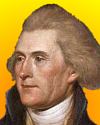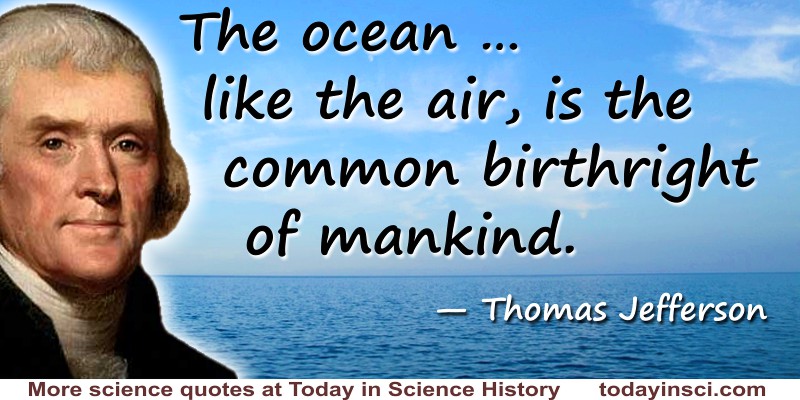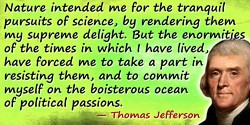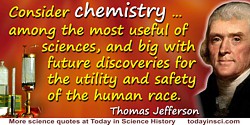 (source)
(source)
|
Thomas Jefferson
(13 Apr 1743 - 4 Jul 1826)
American statesman, astronomer, scholar and inventor who wrote the Declaration of Independence (1776) and organized the Lewis and Clark expedition (1803). His only full-length book, Notes on the State of Virginia contains an outline of the geography, flora and fauna of Virginia, and established his reputation as a scholar and a pioneering American scientist.
|
Thomas Jefferson
“The ocean ... like the air, is the common birthright of mankind”
Illustrated Quote - Large (800 x 400 px)
More Thomas Jefferson quotes on science >>
The New York Tammany Society began in 1789 as a social and benevolent fraternity but it became politically partisan from 17951. It held meetings, parades, “long talks” and toasts to popularize republican principles. It brought together small tradesmen, professionals, merchants and mechanics of Republican persuasion, “defending domestic liberty, preserving national independence.” It did much to bring Jefferson to the presidency, although—as an organization—it did not participate in the campaign of 1800. At almost every important gathering of the Society, they toasted Jefferson, whom they regarded as an “enlightened statesman, the friend of the people and the supporter of their rights.”
On 11 Feb 1808, representing a committee of the Tammany Society, Jacob Van Dervoort wrote to President Thomas Jefferson about commemorating the sacrifice of the countrymen slaughtered in the Revolutionary War.2
Jefferson, on the eve of his resignation as Secretary of State, expressed his concern for the protection of seafaring Commerce in his Final State of the Report on Commerce to the House to Congress (16 Dec 1793), writing:3
When he repeated this theme in his reply to the Society, his context again was the ongoing international conflict on the ocean. Thus the subject quote above is in fact far from being about an environmental perspective of the ocean. However, we can reasonably speculate that if Jefferson knew about the world’s current problems such as over-fishing, pollution, or even climate change, he would be unequivocal in his concern for proper custody of the ocean and atmosphere as resources.
For the record, here is his full reply written by Thomas Jefferson on 29 Feb 1808 to the Society of Tammany or Columbian Order No. 1 of the City of New York:4
I have recieved your address, fellow citizens, and, thankful for the expressions so personally gratifying to myself, I contemplate with high satisfaction the ardent spirit it breathes of love to our country, and of devotion to it’s liberty & independance. the crisis in which it is placed cannot but be unwelcome to those who love peace, yet spurn at a tame submission to wrong. so fortunately remote from the theatre of European contests, and carefully avoiding to implicate ourselves in them, we had a right to hope for an exemption from the calamities which have afflicted the contending nations and to be permitted unoffendingly to pursue the paths of industry & peace. but the ocean, which, like the air, is the common birth-right of mankind, is arbitrarily wrested from us, and maxims consecrated by time, by usage, & by an universal sense of right, are trampled on by superior force. to give time for this demoralizing tempest to pass over, one measure only remained which might cover our beloved country from it’s overwhelming fury; an appeal to the deliberate understanding of our fellow citizens in a cessation of all intercourse with the belligerent nations, until it can be resumed under the protection of a returning sense of the moral obligations which constitute a law for nations as well as individuals. there can be no question, in a mind truly American, whether it is best to send our citizens & property into certain captivity, and then wage war for their recovery, or to keep them at home, and to turn seriously to that policy which plants the manufacturer & the husbandman side by side, and establishes at the door of every one that exchange of mutual labors & comforts which we have hitherto sought in distant regions, and under perpetual risk of broils with them. between these alternatives your address has soundly decided, and I doubt not your aid & that of every real and faithful citizen, towards carrying into effect the measures of your country, and enforcing the sacred principle that in opposing foreign wrong, these must be but one mind.
I receive with sensibility your kind prayers for my future happiness, and I supplicate a protecting providence to watch over your own and our country’s freedom & welfare.
- Science Quotes by Thomas Jefferson.
- 13 Apr - short biography, births, deaths and events on date of Jefferson's birth.
- Jefferson As A Man Of Science - Preface to The Writings of Thomas Jefferson, Vol. 19.
- Thomas Jefferson on Education and Science from a report on establishing the University of Virginia (1818).
- Thomas Jefferson - context of quote “To indulge in the rich fields of nature” - Medium image (500 x 250 px)
- Thomas Jefferson - context of quote “To indulge in the rich fields of nature” - Large image (800 x 400 px)
- Thomas Jefferson - context of quote “The plough ... is really like sorcery” - Medium image (500 x 250 px)
- Thomas Jefferson - context of quote “The plough ... is really like sorcery” - Large image (800 x 400 px)
- Thomas Jefferson - context of quote “Chemistry … among the most useful of sciences” - Medium image (500 x 250 px)
- Thomas Jefferson - context of quote “Chemistry … among the most useful of sciences” - Large image (800 x 400 px)
- Thomas Jefferson - context of quote “The patient … sometimes gets well in spite of the medicine. ” - Medium image (500 x 250 px)
- Thomas Jefferson - context of quote “The patient … sometimes gets well in spite of the medicine. ” - Large image (800 x 400 px)
- Thomas Jefferson on Quack Medicine - from Letter to Dr. Caspar Wistar (1807)
- Thomas Jefferson - context of quote “Nature intended me for the tranquil pursuits of science” - Medium image (500 x 250 px)
- Thomas Jefferson - context of quote “Nature intended me for the tranquil pursuits of science” - Large image (800 x 400 px)
- Thomas Jefferson - context of quote “The ocean ... like the air, is the common birthright of mankind” - Medium image (500 x 250 px)
- Thomas Jefferson: Scientist, by Edwin Thomas Martin. - book suggestion.









